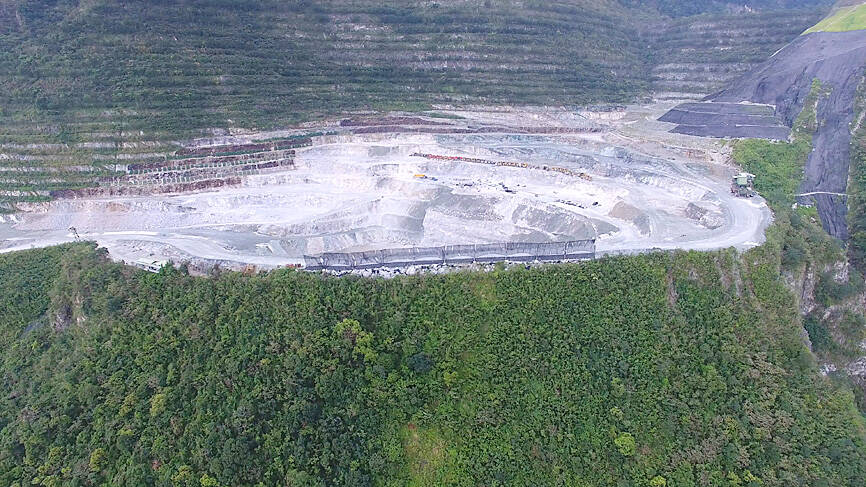Amendments to the Mining Act (礦業法) that would give more say to indigenous communities regarding mining rights in their lands passed the legislature on Friday.
The changes cleared the legislative floor without opposition after more than six years of efforts by lawmakers and environmentalists.
They require mining companies to obtain the consent of local indigenous people before launching projects on designated indigenous lands, in accordance with the Indigenous Peoples Basic Act (原住民族基本法).

Photo courtesy of Citizen of the Earth
Mining firms that have already acquired an extraction permit on such lands without the approval of indigenous residents would be granted one year to conduct negotiations with them and seek their consent, the amendments say.
The Bureau of Mines has said the companies would be allowed to continue mining during negotiations, but if they fail to acquire approval within a year, they would be ordered to suspend operations.
According to the Ministry of Economic Affairs, 79 of the 139 mining sites in Taiwan are on indigenous land. Only 13 have obtained the approval of local indigenous communities.
The amendments include retrospective provisions subjecting large mining projects to rigorous review to ascertain their potential environmental impact, in accordance with Article 5 of the Environmental Impact Assessment Act (環境影響評估法).
A large mining project is defined as a mine covering more than 2 hectares and that has produced more than 50,000 tonnes of ore on average every year over the past five years.
According to economics ministry data, eight large mines would be subject to review, while 31 smaller projects would be required to conduct less rigorous reviews based on Article 28 of the same act.
Lawmakers also addressed provisions in the Mining Act that had long been criticized by environmental groups as serving the interests of mining companies.
One such provision is Article 47, which gives mineral rights holders the right to commence mining projects even if they fail to obtain consent from landowners, as long as they compensate them.
The article, as well as Article 31, which entitles mine developers to claim compensation for losses incurred if a license renewal is denied, are to be removed, the amendments say.
Another major change mandates authorities to place limits on mining activities, for example capping the amount of ore extraction in each project.
Companies that reach their limits would be required to reapply for mining permission, even if their license has not expired.
Citizen of the Earth, Taiwan said that it never sought to bring down the mining industry in Taiwan, but had been working to “correct” the law that was “tilted heavily in favor of the industry.”
Only when the negative effects of mining activity on the environment are reduced and the rights of nearby residents are ensured can the industry shed its notorious reputation in Taiwanese society, it added.

Taiwan is stepping up plans to create self-sufficient supply chains for combat drones and increase foreign orders from the US to counter China’s numerical superiority, a defense official said on Saturday. Commenting on condition of anonymity, the official said the nation’s armed forces are in agreement with US Admiral Samuel Paparo’s assessment that Taiwan’s military must be prepared to turn the nation’s waters into a “hellscape” for the Chinese People’s Liberation Army (PLA). Paparo, the commander of the US Indo-Pacific Command, reiterated the concept during a Congressional hearing in Washington on Wednesday. He first coined the term in a security conference last

Prosecutors today declined to say who was questioned regarding alleged forgery on petitions to recall Democratic Progressive Party (DPP) legislators, after Chinese-language media earlier reported that members of the Chinese Nationalist Party (KMT) Youth League were brought in for questioning. The Ministry of Justice Investigation Bureau confirmed that two people had been questioned, but did not disclose any further information about the ongoing investigation. KMT Youth League members Lee Hsiao-liang (李孝亮) and Liu Szu-yin (劉思吟) — who are leading the effort to recall DPP caucus chief executive Rosalia Wu (吳思瑤) and Legislator Wu Pei-yi (吳沛憶) — both posted on Facebook saying: “I

The Ministry of Economic Affairs has fined Taobao NT$1.2 million (US$36,912) for advertisements that exceed its approved business scope, requiring the Chinese e-commerce platform to make corrections in the first half of this year or its license may be revoked. Lawmakers have called for stricter enforcement of Chinese e-commerce platforms and measures to prevent China from laundering its goods through Taiwan in response to US President Donald Trump’s heavy tariffs on China. The Legislative Yuan’s Finance Committee met today to discuss policies to prevent China from dumping goods in Taiwan, inviting government agencies to report. Democratic Progressive Party Legislator Kuo Kuo-wen (郭國文) said

The Ministry of Economic Affairs has fined Taobao NT$1.2 million (US$36,900) for advertisements that exceeded its approved business scope and ordered the Chinese e-commerce platform to make corrections in the first half of this year or its license would be revoked. Lawmakers have called for stricter supervision of Chinese e-commerce platforms and more stringent measures to prevent China from laundering its goods through Taiwan as US President Donald Trump’s administration cracks down on origin laundering. The legislature’s Finance Committee yesterday met to discuss policies to prevent China from dumping goods in Taiwan, inviting government agencies to report on the matter. Democratic Progressive Party